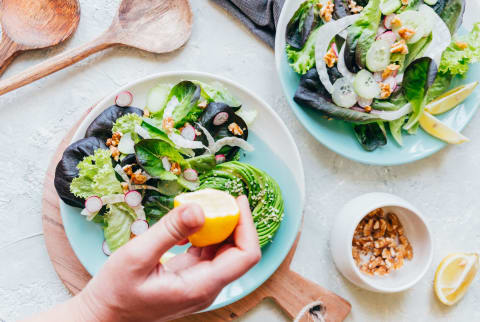Advertisement
How Eating Vegetables Can Improve Your Mood, According To Science


Did you know that eating more vegetables can make you happier? Yes, really—increasing your intake of greens each day can actually make an impact on your mental health, and by eating just two and a half servings daily, you may notice a significant change in your overall happiness (more on that research in a minute).
It's no secret that the food you eat can play into your mood and general comfort in your body, and functional medicine expert Amy Sapola, PharmD, director of Farmacy at The Chef's Garden in Huron, Ohio, took to the mindbodygreen podcast earlier this week to explain why.
How your diet can affect your mood.
Listening to how your body feels after eating certain foods is essential to determining the best nutritional pattern for your physical and mental health, but here's a hint: a cornerstone of this should be vegetables. Referencing a randomized controlled trial published in the Journal of the Academy of Nutrition and Dietetics, Sapola described 75 adults in North Dakota1 who weren't hitting their recommended veggie intake. "In this study, they had their control group, which kept eating very few vegetables, and then their intervention group, which was given vegetables from different groups."
The intervention group ate two and a half servings of veggies (plus legumes, avocados, and other nutrient-dense plants) per day. At the end of eight weeks, these participants scored higher on a happiness scale compared to both their initial rating and the control group. "It's a small study, but it speaks to the gut-brain connection and the power of simply making very small changes," Sapola says. "These people weren't eating 10 or 20 cups of vegetables a day. It was just two and a half cups."
One interesting point of note in this study is that two and a half cups is still not an exceptionally large amount of vegetables, especially in relation to what leading health care experts recommend. "When you look at some of the therapeutic interventions with vegetables and people like [physician] Terry Wahls, M.D., she recommends 12 to 15 cups of vegetables a day. So two and a half is still on the very low side," adds Sapola. "The Mediterranean [diet] plan usually has around four cups of vegetables a day." Moral of the story? Even small dietary changes can make a major impact on your well-being.
How you can add more veggie goodness to your diet.
Sure, salads and roasted vegetables are always an option when looking to bulk up your diet, but our best kept secret? mbg's organic veggies+. A USDA-certified organic greens powder featuring 31 powerhouse ingredients, including organic alkalizing sea vegetables, dark leafy greens, root vegetables, digestive enzymes, and more, not only can it help you squeeze some extra greens goodness into your day, but each spoonful promotes a healthy gut microbiome, aids in smooth digestion, and even delivers a good source of fiber.* Reaching your veggie goals each day has never been easier.
The takeaway.
At mbg, it's no secret we love our greens—and now there's the science to prove that they love us too. Eating your vegetables really can make you happier, and whether you like them air-fried, boiled, or in the form of a functional nutrition greens powder, your body will thank you.